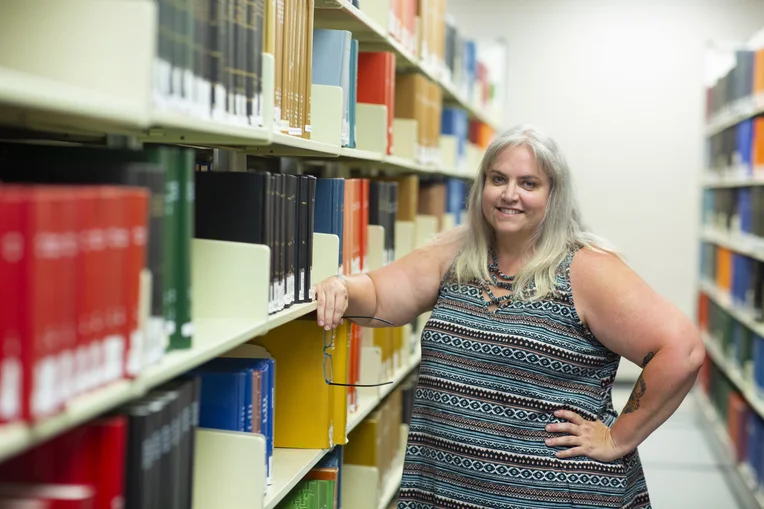Quest Magazine Dr. Rochelle Rowley
"My children came first in my decisions about graduate school."

Family was always a priority to Dr. Rochelle Rowley, but she didn't let that keep her from pursuing her dreams. After a few life changes, she was able to complete her Ph.D. and now serves as faculty in the School of Library and Information Management.
Working in entry-level positions while raising a young family in western Kansas, Rochelle Rowley did not see much opportunity for career growth or further education. That is, not until her husband’s position led to a move to Wichita.
“My plan all along was to get a bachelor’s degree and then things just fell into place each step in the path. I earned by associate’s from Garden City Community College and then completed my bachelor’s in sociology through Fort Hays State’s Virtual College because there really wasn’t any other way to get a bachelor’s in western Kansas — at least not in something I was interested in,” said Rowley. “We happened to move to Wichita during this time and getting a master’s was finally an option.”
Rowley applied for and was accepted into the master’s program in sociology at Wichita State. During her master’s career, she applied to a doctoral program at the University of Kansas, upon which she found her location to once again be her limiting factor.
“I applied to the Ph.D. program at KU and was accepted, but then couldn’t figure out how to raise my family in Wichita and attend the program at KU,” she said. “After two years of graduate school in the sociology department, I knew the statistics associated with negative outcomes for matriculation and later success in life for children who are uprooted in the middle of their K-12 education.”
With two children in high school and one on the verge, that information played a large role in Rowley’s decision-making.
“I also had to weigh my options of moving the family to Lawrence and selling our home, for a loss at that point in life, and my husband changing jobs or commuting. My understanding of KU’s program back in 2007 and the advice I received from mentors at the time led me to believe commuting would not be viewed in a positive light by the sociology department at KU. According to the advice I received, the expectation for graduate students was to not work, teach at least two classes and TA in others, as well as complete your own classes. I couldn’t see my ability to 100% put my education first above my family, so I chose not to go and thought my education was done at that point.”
Just when she thought she was out of options, Rowley came across information regarding a community psychology program at Wichita State.
“I was on a coalition with one of my mentors that focused on reducing instances of domestic violence in Sedgwick County. A facilitator from Wichita State’s Center for Community Support and Research was helping the coalition on strategic planning and informed me about the community psychology track of the psychology department at Wichita State, and I was hooked! I visited the department, put my application in right away and was surprisingly accepted even though I was late getting the materials in. This allowed me to still do what I love, which is work with communities to improve the lives of those in the community and teach, while allowing my children to finish their education in Wichita.”
Following completion of her Ph.D., Rowley was finally able to pursue a career in academia.
“After my Ph.D. was earned, I was able to do what I always wanted to do: teach at the university level. I’ve had opportunities to conduct research on topics I enjoy learning about, I get the opportunity to advise students in their future and see the ‘aha’ moments they get,” she said,
Rowley now serves as a faculty member in the School of Library and Information Management at Emporia State University part-time and a full-time faculty member in the Sociology, Anthropology, and Crime and Delinquency Studies department working with undergraduates.
“I have autonomy in my position as an associate professor and the freedom to explore any option I want to take,” Rowley explained. “Some people think that once you’re done with grad school, the really hard work is over; working as a tenure-track professor was the hardest and most demanding work I've ever done and it is so completely worth it!”
